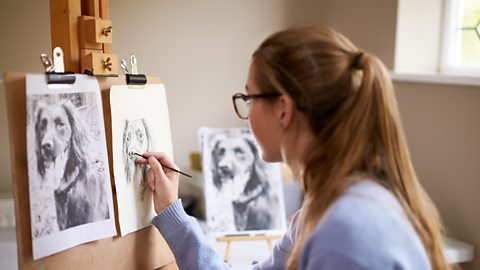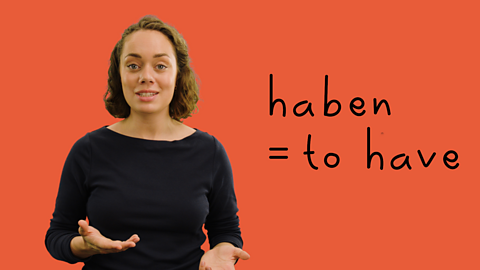Sein (to be) is a very important verb, and it is used in many different situations, including describing people and things, giving opinions and saying where you are.
Sein is irregular. This means that it doesnât follow the same pattern as regular verbs. Think about to be in English. You donât say âI be, you be, he, she and it beâ - instead you say âI am, you are, he, she and it is.â The German verb sein is similar!
The verb 'to be': How to say what, how and where things are in German
The verb âto beâ - sein - is probably the verb youâre going to use the most. And it looks like this:
Ich bin - I am
Du bist - you are
Er/sie/es ist - he/she/it is.
Ich bin means âI amâ.
Want to tell someone how old you are? Ich bin 16 Jahre alt - Iâm 16 years old.
Want to say how youâre feeling? Ich bin froh - I am happy.
Want to say where you are? Ich bin in der Schule - Iâm at school.
If youâre talking about someone or something itâs:
Er ist - he is, sie ist - she is and es ist - it is.
Er ist Lehrer - he is a teacher.
Sie ist intelligent - she is clever.
Es ist schlecht - it is bad.
If youâre asking someone a question youâll need another part of sein - du bist.
Du bist means âyou areâ and if youâre asking someone a question you flip it round: bist du?
Bist du sportlich? - Are you sporty?
Wo bist du? - Where are you?
Wie alt bist du? - How old are you?
So a quick recap:
Ich bin - I am
Du bist - you are
Er/sie/es ist - he/she/it is.
'Sein' in the present tense
You can find the conjugations for sein in the present tense in the table below.
| English | German | Examples |
|---|---|---|
| I am | ich bin | Ich bin Č”°ùŽÇĂ - I am tall. |
| you are | du bist | Du bist intelligent - You are intelligent. |
| he is | er ist | Er ist freundlich - He is friendly. |
| she is | sie ist | Sie ist Einzelkind - She is an only child. |
| it is | es ist | Es ist klein - It is small. |

When to use 'sein'
You can use sein to talk about lots of things, including:
- Your age
- Ich bin elf Jahre alt - I am eleven years old.
- Your nationality
- Icn bin ·ĄČÔČ”±ôĂ€ČÔ»ć±đ°ù - I am English.
- Describing yourself or another person
- Ich bin kreativ - I am creative.
- Er ist sehr Č”°ùŽÇĂ - He is very tall.
- Describing personality
- Meine Schwester ist sehr sympathisch - My sister is very kind.
- What time it is
- Es ist zwei Uhr - It is 02:00.
- Abendessen ist um neunzehn Uhr - Dinner is at 19:00.
- Describe where something is
- Mein Bett ist neben dem Schreibtisch - My bed is next to the desk.
- Giving your opinion
- Mein Lieblingssport ist Tennis - My favourite sport is tennis.

Using 'sein' in questions
You can use sein to ask questions. In sentences, the verb needs to be the second idea, but in questions, the verb comes first. This is called inversion.
- Du bist - You are
- Bist du� - Are you�
- Bist du sportlich? - Are you sporty?
- Ist er kreativ? - Is he creative?
- Ist deine Stadt ruhig? - Is your town quiet?
Using 'sein' in the past tense
To talk about the past, you can use ich war, meaning I was. This is the imperfect tense. You can find more conjugations in the table below.
| English | German | Examples |
|---|---|---|
| I was | ich war | Ich war in der Stadt - I was in town. |
| you were | du warst | Du warst im Kino - You were at the cinema. |
| he was | er war | Er war krank - He was sick. |
| she was | sie war | Sie war sehr nett - She was very nice. |
| it was | es war | Es war gut - It was good. |
Using 'sein' in the future tense
To talk about what will be in the future, you can use a conjugation of werden with sein. The form of werden has to be the second idea in the sentence and sein moves to the end of the sentence. You can find the conjugations of werden in the table below.
| English | German | Examples |
|---|---|---|
| I will be | ich werde ⊠sein | Ich werde kreativ sein - I will be creative. |
| you will be | du wirst ⊠sein | Du wirst Č”°ùŽÇĂ sein - You will be tall. |
| he will be | er wird ⊠sein | Er wird sportlich sein - He will be sporty. |
| she will be | sie wird ⊠sein | Sie wird dreizehn sein - She will be 13. |
| it will be | es wird ⊠sein | Es wird gut sein - It will be good. |
Quiz
Find out how much you know about sein in this short quiz!
Game - FestiLingo: German. game
Visit the festival and practise German language skills in this game

More on Grammar
Find out more by working through a topic
- count3 of 8
